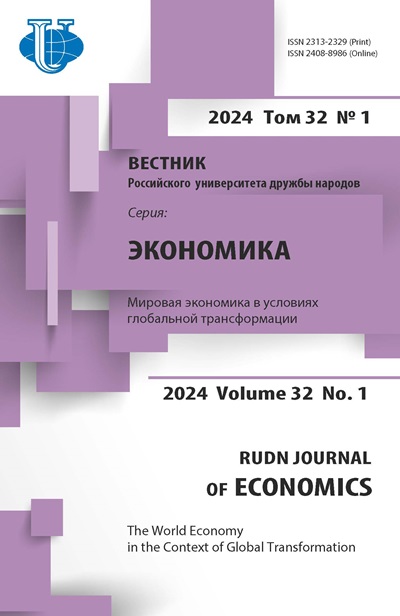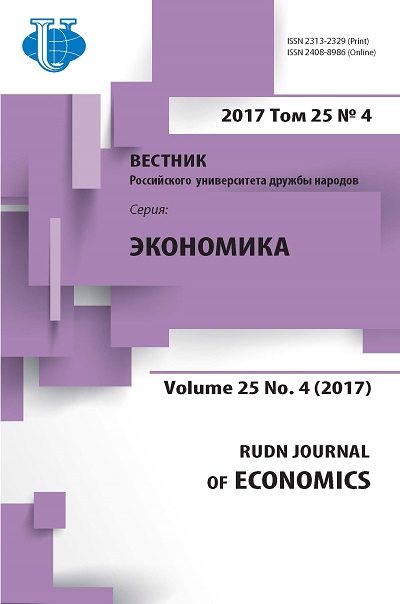Classification and selection criteria of Russian systemically important companies
- Authors: Anisenko NA1
-
Affiliations:
- Peoples’ Friendship University of Russia
- Issue: Vol 25, No 4 (2017)
- Pages: 534-542
- Section: Articles
- URL: https://journals.rudn.ru/economics/article/view/18228
- DOI: https://doi.org/10.22363/2313-2329-2017-25-4-535-542
Cite item
Full Text
Abstract
During the crisis, systemically important companies from various industries were in need of state support as a result of sanctions policy. This report aims to systematise the different classifications for such enterprises, thereby facilitating the monitor of their activities. This study draws upon recently published articles in the field and used a range of methods, including analysis, synthesis, classification and formalization. The results of this investigation are presented in the form of detailed descriptions of the types of enterprises studied and; their significance for the state budget, volume of tax revenues, jobs created and market share. In conclusion, the findings reveal that the existing system for monitoring the activities of strategic companies is outdated and needs updating in light of Russia’s present economic situation. Alongside the development of more relevant selection criteria and classification systems, it is equally important to refine the existing methodologies to facilitate government monitoring.
About the authors
N A Anisenko
Peoples’ Friendship University of Russia
Author for correspondence.
Email: Anisenko.nikita@gmail.com
Post-graduate student of the department of national economy
6, Miklukho-Maklaya str., Moscow, Russia, 117198References
- Federal’nyj zakon «O nesostojatel’nosti (bankrotstve)» ot 26.10.2002 № 127-FZ (red. ot 29.07.2017) (In Russ).
- Postanovlenie Pravitel’stva RF ot 29 avgusta 1994 g. № 1001 «O porjadke otnesenija predprijatij k gradoobrazujushhim i osobennostjah prodazhi predprijatij-dolzhnikov, javljajushhihsja gradoobrazujushhimi» — «Obshhie polozhenija» punkt 3. (In Russ).
- Selezneva O.A. (2016) Vlijanie sistemoobrazujushhih hozjajstvujushhih sub#ektov na social’nojekonomicheskoe razvitie municipal’nyh obrazovanij. Molodoj uchenyj. 2016. Vol. 11. P. 967—970. (In Russ).
- Shastitko A., Avdasheva S., Golovanova S. (2009) Konkurentnaja politika v period krizisa. Voprosy jekonomiki. 2009. № 3. P. 54—69. (In Russ).
- Sistemoobrazuyushchie predpriyatiya spasat ili net? Delovoj Peterburg URL: http://blog.dp.ru/ post/9101 (accessed: 15.11.2016) (In Russ).
- Guseev V.V., Malyj V.I. Rossijskie sistemoobrazujushhie kompanii pod dejstviem jekonomicheskih sankcij: social’nye vyzovy i novye vozmozhnosti (na primere PAO «Gazprom»). Vestnik Tomskogo gosudarstvennogo universiteta. 2016. Vol. 1 (33). P. 63—75. doi: 10.17223/1998863Х/33/8 (In Russ).
- Novye sankcii protiv Rossii: krushenie proizojdet absoljutno tochno. Rossija Segodnja (Inosmi.ru) URL: http://inosmi.ru/politic/20170726/239903258.html (accessed: 26.07.2017). (In Russ).
- Glazev S.YU. Doklad Sovbezu RF. Mir tesen 2015. URL: http://sobityadnya.ru/blog/43464056003/ Doklad-Sovbezu-RF-Sergeya-Glazeva-(polnyiy-tekst) (accessed: 18.09.2015) (In Russ).
- Rasporyazheniem Kabineta Ministrov Respubliki Tatarstan ot 20.06.2017 № 1363-r. URL: http:// mert.tatarstan.ru/rus/index.htm/news/952743.htm (accessed: 18.10.2017) (In Russ).
- Perechen sistemoobrazuyushchih predpriyatij Moskovskoj oblasti Ministerstvo investicij i innovacij moskovskoj oblasti URL: http://mii.mosreg.ru/dokumenty/razvitie_promyshlennosti/ sistemoobrazuyuschie_predpriyatiya_moskovskoy (accessed: 18.10.2017) (In Russ).















